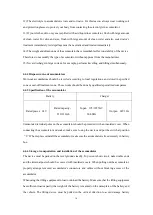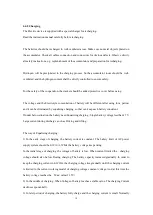
15
maintenance and replacing. Before operation carefully read instruction manuals including operation
manual, replenishment preparation and recharging requirements.
4.4.2 Fire Prevention Measures
Never smoke or use open fire when perform operations on the accumulator. The accumulator should
be away from flammable material at least two meters when storage or recharging. The location for
accumulator storage should be well ventilated and equipped with firefighting devices.
4.4.3Maintenance of the Accumulator
1) Keep the nuts on every battery cell dry and clean. Tighten every terminal and cable end, and
brush them with grease to prevent corrosion. Naked cable ends and terminal posts should be covered
with a skid-proof insulating cover.
2) Every two cells should be well-connected. Check the nuts on each pole, if loose, tighten the nuts.
3) Keep the surfaces of accumulator clean and dry. After the completion of recharging, clean spilled
acid with cotton yarns or brush. And clean with wet towel if necessary.
4) Over recharging and over discharging should be avoided, and fast charging and insufficient
recharging are also not allowed. Otherwise life span of the accumulator may be affected.
5) Do not put conductive objects including metal tools on the accumulator, or short circuit or even
explosion may be caused.
6) Never spill any hazardous liquid or solid material on surfaces of the accumulator. When using a
densimeter or a thermometer, make sure the surface is clean and clear.
7) Recharge the discharged accumulator in time. Delayed recharging may damage the accumulator.
Do not delay recharging more than 24 hours. Recharging of the accumulator may not work outdoors
in cold weather. In this case, move it indoors to perform recharging.
8) If the accumulator will not be in use for a long time, it should be recharged and discharged once
every month and it should be fully recharged every time.
9) During recharging or using, the liquid level of electrolyte lowers because of water evaporation,
so pure water should be added.
10) If individual cell fails, identify the cause and repair the cell immediately. Replace the cell when
it cannot be repaired.
11) The site for recharging should be well ventilated. It is prohibited to smoke or use open fire,
avoiding the risk of hydrogen explosion.







































